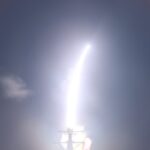
The Navy anticipates awarding a new version of the engineering and manufacturing development (EMD) contract for the Next Generation Jammer-Low Band(NGJ-LB), according to a Defense Department reprogramming request for fiscal year 2023. A June 30 $4 billion omnibus reprogramming request by the DoD comptroller asked to reduce $51 million in the Next Generation Jammer Increment II program, shifting funds from $135 million to $84 million. The department said these funds are available due to protests against the EMD contract, so…

 By
By 











